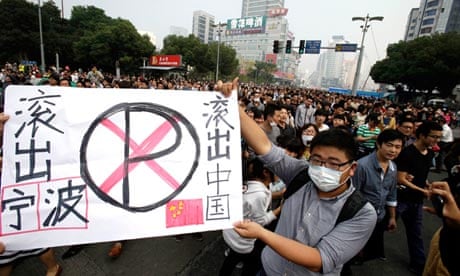Dozens of riot police marched towards crowds of people protesting over a chemical factory in an eastern Chinese city on Sunday and bundled demonstrators into government offices, raising tensions a day after clashes between thousands of residents and police.
Several hundred citizens of Ningbo in Zhejiang province had gathered outside the offices of the municipal government, demanding the release of demonstrators they believed had been detained by police on Saturday. The residents were protesting against a plan to expand a petrochemical factory.
"We can only depend on ourselves now. We can't count on the government to think about us," said one protester.
Without warning, about 200 officers who had been sitting inside the gate of the city government offices put on their helmets and came out of the compound.
They tore down banners from trees and grabbed at least three protesters, carrying them into the government compound. The protesters' fairly cheerful mood turned tense and people threw plastic bottles and shouted "Release the people!"
On Saturday, residents reported that protests involving thousands of people had turned violent after authorities used teargas and arrested participants. Authorities said "a few" people had disrupted public order by staging sit-ins, unfurling banners, distributing fliers and obstructing roads. They added that the proposed project was under evaluation and that the public were being given opportunities to have their say.
There have been protests in China this year over fears of health risks from industrial projects as people who have seen their living standards improve become more outspoken against environmentally risky projects in their areas.
A week earlier, hundreds protested for several days in a small town on China's Hainan island over a coal-fired power plant.
Such protests are embarrassing for the Chinese leadership before next month's once-a-decade transition of power, with stability being paramount.
A 30-year-old woman surnamed Wang said officers had taken her to a police station on Saturday and made her sign a guarantee that she would not participate in any more protests, but she came back on Sunday anyway.
"They won't even let us sing the national anthem," she said. "They kept asking me who the leader of the protests was and I said that this is all voluntary. We have no leader."
In a sign that censors were at work, the name "Zhenhai", the city district where the factory is located, was blocked on China's popular microblogging site Sina Weibo and searches for "chemical expansion project" were greeted with the line: "Some search results are not shown according to regulations." Those that were visible included postings from media sites that said authorities were holding meetings to hear public opinion.
Some protesters wore face masks and shouted slogans including "Protect Ningbo" and "Return my health" while pumping their fists in the air. Cars were forced to stop as a long stretch of people marched along roads.
"We have to do this for our future and our family's future," said a protester, Jing, as she pointed to the smoggy air. "The sky was so clear when I was a child. Look at it now."
Another protester, Yu Yibing, said he wanted the factory to be closed and his seven-year-old son to grow up in a clean environment. "As the common people, we need to live in a green environment. This is a reasonable request," said Yu, 38. "But the government only puts out some statement and refuses to see us and also suppresses us. I don't know how else we can express our views."
The Zhenhai district government, which comes under the Ningbo government, said Ningbo's Communist party chief, Wang Huizhong, and the mayor, Liu Qi, had held discussions with local residents on Saturday night.
A statement posted on the district government's website on Sunday said the opinions and advice of the people who attended "are very helpful" to the party committee and municipal government's decision-making and that the expansion project was "at an early stage".
"We will further solicit opinions and respond to people's concerns and actively respond to people's reasonable requests and demands," the statement said.
The Zhenhai government earlier said it would organise public hearings attended by residents and experts to assess the environmental impact of the project.
The official Xinhua news agency said the planned project was designed to produce 15m tonnes of refined oil and 1.2m tonnes of ethylene a year and belongs to Sinopec Zhenhai Refining & Chemical Company, which has invested 55.87bn yuan (£5.5bn).
